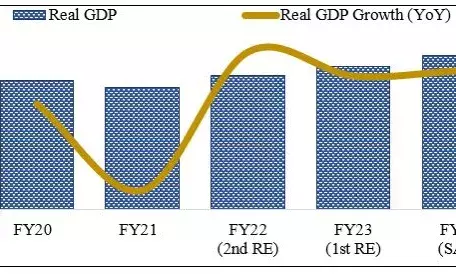Indian Economy Logs Strong 8.4% Growth in Q3, Prime Minister Vows Continued Efforts
India's economy records impressive 8.4% growth in Q3 2023-24, signaling strong recovery. PM Modi highlights government's commitment to sustained economic growth.;

New Delhi, Feb 29, 2024: The Indian economy registered a robust 8.4% growth in the third quarter of the 2023-24 fiscal year, according to data released earlier today. This positive growth rate has been hailed by Prime Minister Narendra Modi as a testament to the strength and potential of the Indian economy.
In a statement, the Prime Minister highlighted the 8.4% GDP growth as a sign of the economy's resilience and potential. He further emphasized the government's commitment to sustaining this momentum and achieving faster economic growth in the future.
This significant GDP growth indicates a robust economic recovery in India, following the challenges posed by the pandemic. The Strong performance is likely to be attributed to various factors, including increased consumer spending, government initiatives, and a revival in key sectors like manufacturing and services.
While this news is encouraging, it is crucial to acknowledge that economic experts often caution against interpreting isolated data points as definitive indicators of long-term trends. Nevertheless, the strong Q3 performance serves as a positive sign for the Indian economy's potential and paves the way for further growth and development in the coming quarters.
"Our efforts will continue to bring fast economic growth which shall help 140 crore Indians lead a better life and create a Viksit Bharat," the Prime Minister stated, referring to the vision of a developed India.
This positive economic news comes at a time when the global economy is facing headwinds from various factors, including geopolitical tensions and rising interest rates. India's strong economic performance in Q3 is expected to boost investor confidence and position the country as a key player in the global marketplace.
However, analysts caution that it is crucial to address existing challenges such as unemployment and inflation to ensure inclusive and sustainable economic growth in the long run.

